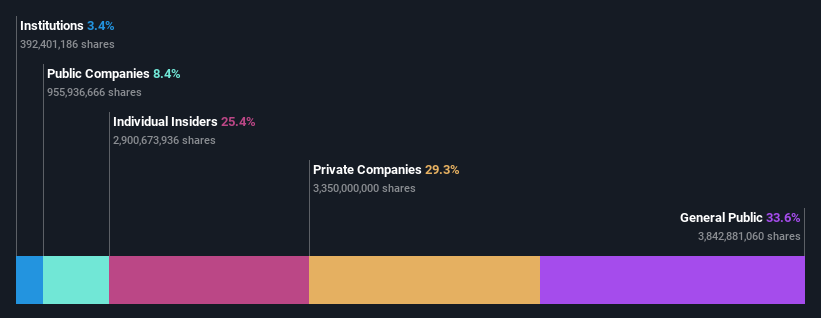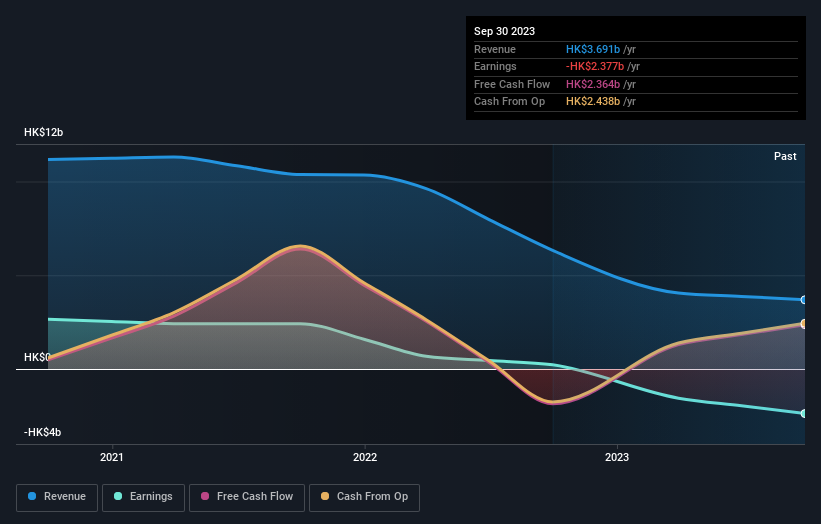Stock Analysis
- Hong Kong
- /
- Real Estate
- /
- SEHK:1668
Retail investors are China South City Holdings Limited's (HKG:1668) biggest owners and were hit after market cap dropped HK$229m

Key Insights
- China South City Holdings' significant retail investors ownership suggests that the key decisions are influenced by shareholders from the larger public
- The top 3 shareholders own 58% of the company
- 25% of China South City Holdings is held by insiders
A look at the shareholders of China South City Holdings Limited (HKG:1668) can tell us which group is most powerful. And the group that holds the biggest piece of the pie are retail investors with 34% ownership. In other words, the group stands to gain the most (or lose the most) from their investment into the company.
As market cap fell to HK$1.6b last week, retail investors would have faced the highest losses than any other shareholder groups of the company.
Let's delve deeper into each type of owner of China South City Holdings, beginning with the chart below.
Check out our latest analysis for China South City Holdings

What Does The Institutional Ownership Tell Us About China South City Holdings?
Institutions typically measure themselves against a benchmark when reporting to their own investors, so they often become more enthusiastic about a stock once it's included in a major index. We would expect most companies to have some institutions on the register, especially if they are growing.
Less than 5% of China South City Holdings is held by institutional investors. This suggests that some funds have the company in their sights, but many have not yet bought shares in it. If the business gets stronger from here, we could see a situation where more institutions are keen to buy. When multiple institutional investors want to buy shares, we often see a rising share price. The past revenue trajectory (shown below) can be an indication of future growth, but there are no guarantees.

We note that hedge funds don't have a meaningful investment in China South City Holdings. The company's largest shareholder is Shenzhen SEZ Construction & Development Group Co.,Ltd, with ownership of 29%. In comparison, the second and third largest shareholders hold about 20% and 8.4% of the stock. Chung Hing Cheng, who is the second-largest shareholder, also happens to hold the title of Top Key Executive.
A more detailed study of the shareholder registry showed us that 3 of the top shareholders have a considerable amount of ownership in the company, via their 58% stake.
Researching institutional ownership is a good way to gauge and filter a stock's expected performance. The same can be achieved by studying analyst sentiments. We're not picking up on any analyst coverage of the stock at the moment, so the company is unlikely to be widely held.
Insider Ownership Of China South City Holdings
The definition of an insider can differ slightly between different countries, but members of the board of directors always count. Company management run the business, but the CEO will answer to the board, even if he or she is a member of it.
I generally consider insider ownership to be a good thing. However, on some occasions it makes it more difficult for other shareholders to hold the board accountable for decisions.
Our most recent data indicates that insiders own a reasonable proportion of China South City Holdings Limited. Insiders have a HK$403m stake in this HK$1.6b business. We would say this shows alignment with shareholders, but it is worth noting that the company is still quite small; some insiders may have founded the business. You can click here to see if those insiders have been buying or selling.
General Public Ownership
The general public-- including retail investors -- own 34% stake in the company, and hence can't easily be ignored. While this group can't necessarily call the shots, it can certainly have a real influence on how the company is run.
Private Company Ownership
Our data indicates that Private Companies hold 29%, of the company's shares. It might be worth looking deeper into this. If related parties, such as insiders, have an interest in one of these private companies, that should be disclosed in the annual report. Private companies may also have a strategic interest in the company.
Public Company Ownership
It appears to us that public companies own 8.4% of China South City Holdings. We can't be certain but it is quite possible this is a strategic stake. The businesses may be similar, or work together.
Next Steps:
I find it very interesting to look at who exactly owns a company. But to truly gain insight, we need to consider other information, too. Take risks for example - China South City Holdings has 4 warning signs (and 2 which are potentially serious) we think you should know about.
Of course this may not be the best stock to buy. Therefore, you may wish to see our free collection of interesting prospects boasting favorable financials.
NB: Figures in this article are calculated using data from the last twelve months, which refer to the 12-month period ending on the last date of the month the financial statement is dated. This may not be consistent with full year annual report figures.
Valuation is complex, but we're helping make it simple.
Find out whether China South City Holdings is potentially over or undervalued by checking out our comprehensive analysis, which includes fair value estimates, risks and warnings, dividends, insider transactions and financial health.
View the Free AnalysisHave feedback on this article? Concerned about the content? Get in touch with us directly. Alternatively, email editorial-team (at) simplywallst.com.
This article by Simply Wall St is general in nature. We provide commentary based on historical data and analyst forecasts only using an unbiased methodology and our articles are not intended to be financial advice. It does not constitute a recommendation to buy or sell any stock, and does not take account of your objectives, or your financial situation. We aim to bring you long-term focused analysis driven by fundamental data. Note that our analysis may not factor in the latest price-sensitive company announcements or qualitative material. Simply Wall St has no position in any stocks mentioned.
About SEHK:1668
China South City Holdings
China South City Holdings Limited, together with its subsidiaries, develops and operates integrated logistics and trade centers in the People’s Republic of China.
Good value with mediocre balance sheet.

